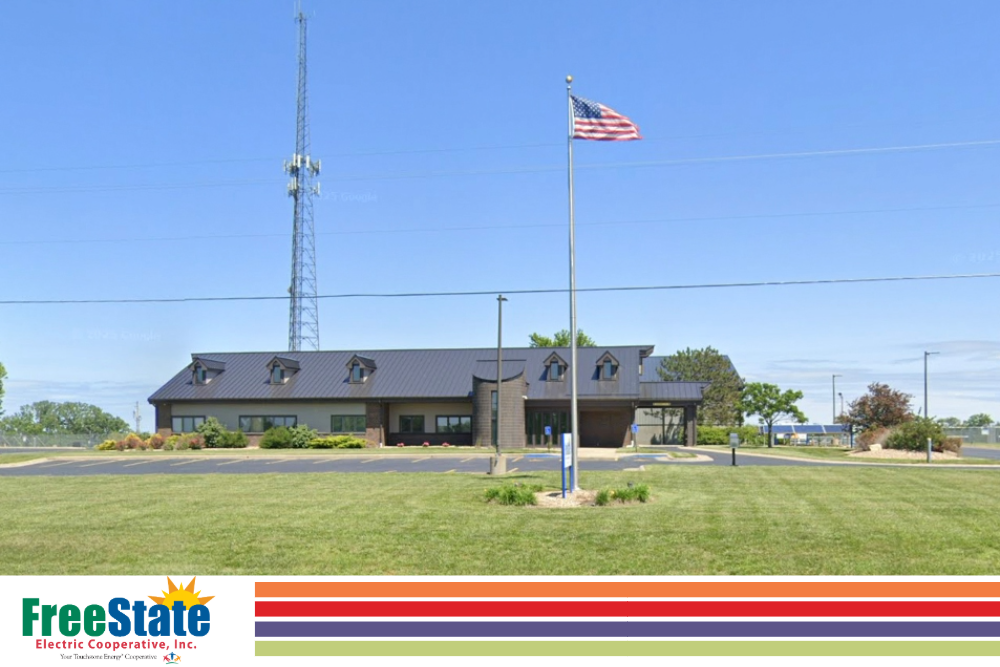Please call 1-800-794-1989 or use the SmartHub mobile app. To talk to a person, press zero.
The time has come for a major decision about the future of FreeState facilities in Topeka and McLouth.
Electric cooperatives across the country are choosing to either build new administration facilities or make significant renovations to modernize existing facilities due to not only growth, but a changing landscape for workplaces focused on efficiency and safety. Renovation of current spaces makes the most financial sense. Construction will provide the space necessary to support growth and efficiency long into the future.
FreeState has fielded questions about operating two facilities since 2019. Leadership and the board have taken a closer look at facilities after evaluating our needs, adding specialized positions and recognizing changes in the energy industry and our growth potential. As the cooperative expands, challenges are:
- Repairing and maintaining aging facilities with outdated equipment and workspaces that hinder efficiency.
- Improving physical safety of employees and facilities.
- Supporting modern workflows, accommodating specialized equipment and designing improved environments for employees and guests.
- Providing greater service resilience as member expectations transform and as energy needs become more diverse.
The existing cooperative facilities were constructed in 1996 (Topeka) and 1976 (McLouth) and have served the membership of both the legacy cooperatives (Kaw Valley and Leavenworth-Jefferson) and FreeState well. However, the need for enhanced security, technology and safety means the two buildings no longer meet the cooperative’s needs in their current configuration.
Renovations and the realignment of administrative services will provide a comprehensive upgrade for members and employees.
“Simply put,” said Chris Parr, CEO. “We have outgrown our operational spaces. We can find efficiencies and long-term savings by making some adjustments to how we do business that should carry us well into the future.”
“Our line crews are staying right where they are because that makes sense from an operations perspective,” Parr said. “Our field staff just need more space.”
All administrative positions will move to the Topeka office, which will become the cooperative’s headquarters and the McLouth building will become an operations center. Members will no longer have access to the McLouth office as of June 1, 2026.
While leadership did not have facilities as an urgent priority, that shifted when issues came up with the buildings. For instance, a tornado warning during the 2024 annual meeting highlighted the need for a larger storm shelter with improved accessibility. There have also been issues with water infiltration, space constraints, and energy deficiencies in both offices. The operations and warehouse functions are spread across multiple undersized buildings, causing delays in locating and loading equipment, as well as potential safety hazards.
“Our facilities are aging, and we were looking at some major repairs that made us take a closer look at facilities overall,” Parr said. “We were at a crossroads, in a way. Do we invest in repairs to two buildings that we know will not meet the needs in the future, or do we invest in something different that will?”
“We understand that this change will bring a mix of emotions,” said Parr. “At the end of the day we have to do what is best for the cooperative and the future of powering our members.”
Parr said the leadership team and board went to the drawing board and brought in a consultant that specialized in cooperative facilities to evaluate and determine what would be needed in the next 30 years. That process took about 10 months and produced a variety of options.
“We looked at multiple scenarios, and some of those — we knew immediately would not work,” Parr said. “We knew a brand-new facility was not feasible because of the cost and the impact it would have to our entire workforce and our members.”
Instead, Parr said, the board and leadership looked at options that had less negative impact.
“We wanted to make sure we had the least disruption possible to our teams, and our members,” said Parr. “We looked at a few different options for our administrative teams and McLouth did not have the space we needed to house our entire admin staff and field staff. Our district line and right-of-way crews, however, were exactly where they needed to be considering the response time needed and expected by members.”
Both district warehouse spaces are at capacity and need reconfigured for more efficient workflow, loading and delivery of materials.
On the office side, McLouth did not have the space to accommodate all administrative functions. In Topeka there was space, but the configuration did not meet the needs for safety, efficiency and workflows.
“Topeka had the space, but the layout was not set up for larger teams like our member services team,” Parr said. “The current setup also showed underutilized spaces in our basement, and current lobby.”
“However, with some renovation we could make it work within the current footprint,” said Parr.
The board made the final decision to invest in renovations using a phased approach. Removing administrative tasks from McLouth will allow the operations department the space they need to improve efficiency, storage and safety.
The office in Topeka will undergo a full renovation inside with just a few subtle changes to the outside appearance of the building. Some changes members may see in Topeka are the discontinuation of the drive-up window and a smaller lobby area.
WORKFLOW EFFICIENCY
The comprehensive renovation focuses on improving facilities for employees with reconfigured workspaces and improved restroom and break room facilities. In Topeka, the design includes a multi-purpose room for activities such as board meetings, member events and employee training.
“We will be able to move our board meetings back to the cooperative office,” said Board President Jeanine Murphy. “For the past eight years we have had a rotation or have convened at neutral sites. This has worked out, but we are ready for more permanence and a space that better serves our needs.”
The board of trustees have set a goal of keeping the work within or adjacent to FreeState territory. Local general contractor, Kendall Construction, will manage the project with Topeka-based HTK Architects.
“We believe that, with the approach we selected, we can execute this project in a more viable manner,” said Murphy. “The time to do any construction is now, because we also know that costs will continue to rise.”
The cooperative will be able to leverage construction work plans for most of this project, which puts less financial pressure on the cooperative overall.
“We know we have to do something to make sure we are set up for the future, and it makes sense to do renovations concurrent with necessary repairs,” Murphy added.
This content was featured in the October 2025 centerspread of Kansas Country Living Magazine.

